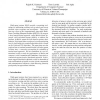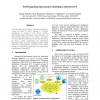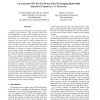SASO
2007
IEEE
14 years 5 months ago
2007
IEEE
This paper describes, and evaluates benefits of, a design methodology to translate certain mathematical models into the design of novel, self-adaptive, peer-to-peer (p2p) distrib...
SASO
2007
IEEE
14 years 5 months ago
2007
IEEE
Multi-agent systems (MAS) provide a promising technology for addressing problems such as search and rescue missions, mine sweeping, and surveillance. These problems are a form of ...
SASO
2007
IEEE
14 years 5 months ago
2007
IEEE
In current information systems, information is passive. People act upon it, either sending it to known destinations or pulling it from known sources. InformANTS makes information ...
SASO
2007
IEEE
14 years 5 months ago
2007
IEEE
The concept of self-organization is rapidly gaining importance in the area of distributed computing systems. However, we still lack the necessary means for engineering such system...
SASO
2007
IEEE
14 years 5 months ago
2007
IEEE
— Designing and implementing artificial self-organizing systems is a challenging task since they typically behave nonintuitive and no theoretical foundations exist. Predicting a...
SASO
2007
IEEE
14 years 5 months ago
2007
IEEE
SASO
2007
IEEE
14 years 5 months ago
2007
IEEE
Incentives for resource sharing are crucial for the proper operation of P2P networks. The principle of the incentive mechanisms in current content sharing P2P networks such as Bit...
SASO
2007
IEEE
14 years 5 months ago
2007
IEEE
Management in pervasive systems cannot rely on human intervention or centralised decision-making functions. It must be devolved, based on local decision-making and feedback contro...
SASO
2007
IEEE
14 years 5 months ago
2007
IEEE
The task of tracking an object has been fully studied and many solutions presented before. However, it is a perfect test bed for the study of a novel model using Coupled Chaos Sys...
SASO
2007
IEEE
14 years 5 months ago
2007
IEEE
Internet Connectivity Establishment (ICE) is becoming increasingly important for P2P systems on the open Internet, as it enables NAT-bound peers to provide accessible services. A ...



